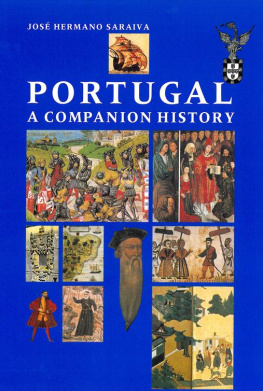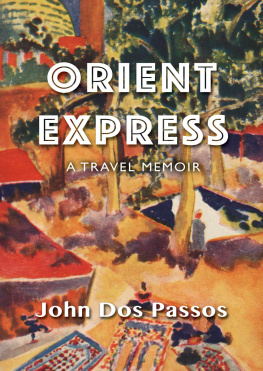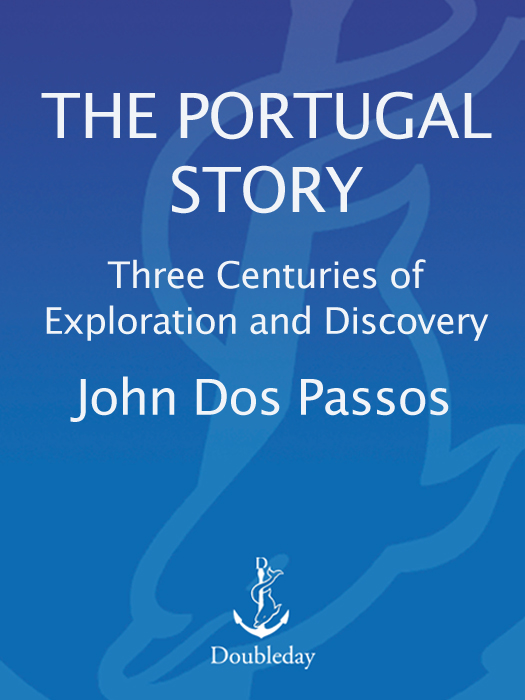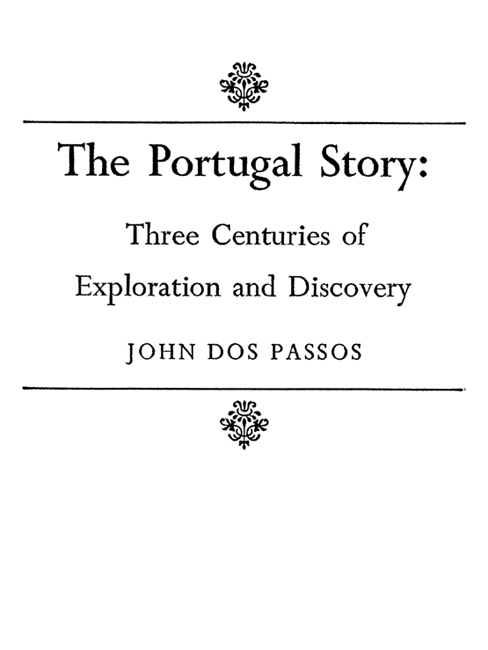Books by
JOHN DOS PASSOS
HISTORICAL NARRATIVES
THE GROUND WE STAND ON
THE HEAD AND HEART OF THOMAS JEFFERSON
THE MEN WHO MADE THE NATION
MR. WILSONS WAR
THE SHACKLES OF POWER
THE PORTUGAL STORY
RAPPORTAGE
JOURNEYS BETWEEN WARS
THE STATE OF THE NATION
TOUR OF DUTY
BRAZIL ON THE MOVE
CONTEMPORARY CHRONICLES
CHOSEN COUNTRY
THREE SOLDIERS
MANHATTAN TRANSFER
THE 42ND PARALLEL
NINETEEN NINETEEN
THE BIG MONEY
THE MOST LIKELY TO SUCCEED
ADVENTURES OF A YOUNG MAN
NUMBER ONE
THE GRAND DESIGN
THE GREAT DAYS
MIDCENTURY

PUBLISHED BY DOUBLEDAY
a division of Random House, Inc.
All characters in this book are fictitious,
and any resemblance to actual persons,
living or dead, is purely coincidental.
Copyright 1969 by John R. Dos Passos
All rights reserved. No part of this book may be reproduced or transmitted in any form or by any means, electronic or mechanical, including photocopying, recording, or by any information storage and retrieval system, without written permission from the publisher. For information, address Doubleday, a division of Random House, Inc.
DOUBLEDAY and the portrayal of an anchor with a dolphin are registered trademarks of Doubleday, a division of Random House, Inc.
The Library of Congress has cataloged the hardcover edition as:
LIbrary of Congress Catalog Card Number 69-12227
A hardcover edition of this book was published in 1969 by Doubleday
First shortrun edition published 2004
eISBN: 978-0-307-78706-4
v3.1
ACKNOWLEDGMENTS
So many people were helpful during my last trip through Portugal to check on the materials for this book that it is hardly possible to thank them all. There were the boys who led us through vineyards up in the valley of the Douro on that long search to find the cave that had prehistoric paintings in it. There was my old friend Dr. Cintra who took us to that lovely clear cove in the flank of the Serra da Arrabida and introduced me to the conventinho up the hill. There was Senhora Acabado at the National Archives who found me reprints of the books in the Torre do Tumbo collection. There was a very well-informed gentleman named Alarcn who showed us about the excavations at Conimbriga. The pleasantest law student took us through the university at Coimbra. My friend Lieutenant-Colonel Afonso do Pao brought me up to date on the recent excavations. His running commentary as he guided us through the archaeological museum at Belm was an education in Portuguese pre-history. His monograph on the excavation of the battlefield at Aljubarrota, with his personal explanations and impromptu sketches, gave me a fresh picture of the tactics of that battle. The trip with him up to the citnia of Sanfins was unforgettable. To all these ladies and gentlemen many thanks.
Samuel Eliot Morisons detailed report on ships and navigation in the fifteenth century in his Admiral of the Ocean Sea was essential. Two other American publications were particularly useful. Francis M. Rogers careful researching of John of Avis son Pedros actual travels dispelled the fantasies these travels were enveloped in by nineteenth-century historians. Charles Wendell Davids fine edition of the low Latin text of De Expugnatione Lyxbonensi furnished the vividest picture of twelfth-century siege warfare I found anywhere. Though my quotations from the writings of these scholars are trifling I owe them a debt of gratitude. Many thanks, too, to Tarcsio Beal for his careful overhaul of my Portuguese spellings.
CONTENTS
PART ONE
How Portugal Began
PART TWO
Heirs of the Adventurers
PART THREE
The Enterprise of the Indies
PART FOUR
Peak of Empire
PART FIVE
Portugal in America
LIST OF ILLUSTRATIONS
A NOTE ON PRONUNCIATION
Portuguese names present certain problems to the English-speaking reader, but for the purposes of this book he needs only to worry about a few Portuguese sounds. Lh like ll in Castilian has the sound of lli in million. Nh is equivalent to ny in canyon. reads s as in French. The nasal diphthongs are difficult but the reader can get by if he pronounces the Portuguese Joo as something between the French Jean and plain English John; ve as in Cames sounds something like oi in joins, i.e. Camoins.
To try to English all the proper names would have been confusing, so I have only used the English form of the most often mentioned cities and the most prominent historical characters. Thus Lisboa is written Lisbon. O infante Dom Henrique comes out Prince Henry. The most important Joos of the Houses of Avis and Bragana are written John, but for the Spaniards I have kept the Castilian Juan since the pronunciation comes easily to most Americans: Hwan.
J.D.P.

PART ONE
How Portugal Began
1
THE HILL PEOPLE
Between beds of petunias in the main square of the village of Mura in Portugals northeasternmost province there stands on a pedestal a rudely carved stone boar. In front of the ancient hilltop fortifications of Bragana, some fifty miles further inland, another forms the base of an ancient pillory which has been ascribed to Visigothic times. These ornamented stone pillars to which criminals were tied up for punishment were the symbols of authority in every Portuguese town. Other boars have been found incorporated into Roman family altars. Stone boars turn up in Galicia and in the walled city of Ciudad Rodrigo in Spanish Leon. In Portugal they are simply known as porcos or porcas. In Spain they are called verracos and some people try to imagine that they are bulls. The country people still regard them with a certain half humorous awe. Through the ages they have been dimly associated with fertility, authority, power. Scholars tax their imaginations speculating about their origin.
The most popular theory is that these stone boars were the work of some of the Celtic peoples who started drifting into the Iberian peninsula across the western passes of the Pyrenees toward the latter part of the tenth century before Christ.
The Celts and possibly Germanic groups that came along with them, all speaking languages of the Indo-European family, seem to have brought in a more advanced agricultural culture than had prevailed among the shellfish eaters of the coast of what is now Portugal. In early days some of them may have been food gatherers who lived largely on acorns and chestnuts, but long before the Carthaginians and the Romans arrived to trouble them they were cultivating wheat for bread, barley for beer and flax for clothing. They seem to have passed their lives in a state of continual warfare, raiding and counterraiding. For defense they huddled in villages of round stone housesthe foundations that have been excavated give a little the impression of stone igloosset in a tangle of defensive walls on the most imposing heights they could find. Traces of them are turning up on almost every mountaintop in northern Portugal.
















